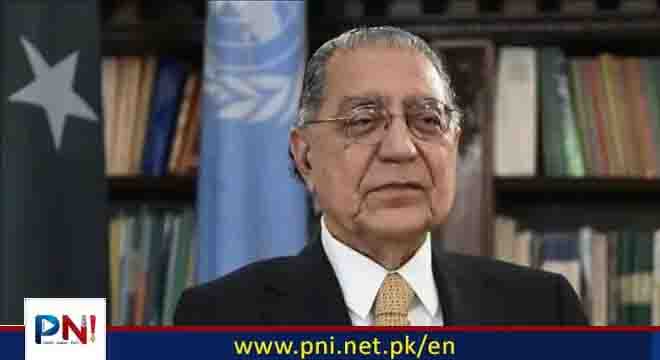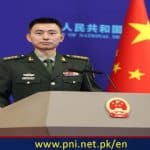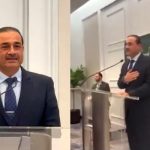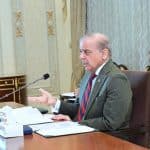UNITED NATIONS, Jan 14 : Pakistan called for debt relief and restructuring as part of a broader effort to address climate change and economic distress at a solemn ceremony marking the handover by Uganda of the Chairmanship of Group of 77 and China to Iraq on Monday.
“We are in a moment where inequality among and within countries is increasing, and we see 800 million plus people living in extreme poverty,” said Ambassador Munir Munir who twice led the G-77, an alliance of developing countries established on 15 June 15 1964. The group derives its name from the 77 original signatories, although it now has 134 members.
G-77 is the largest intergovernmental coalition of developing countries at the United Nations, which provides the means for the countries of the South to articulate and promote their collective economic interests and enhance their joint negotiating capacity on all major international economic issues within the UN system, and promote South-South cooperation for development.
Ambassador Akram served as chairman of the group in 2007 and 2021 during his distinguished service at the United Nations.
Speaking at the ceremony, the Pakistan envoy added, “We are living in a time when the climate catastrophe visits the developing as well as the developed countries. And perhaps, this is awakening, finally, the realization that climate change is an existential challenge for the entire planet.”
Accepting G-77’s presidency on behalf of Iraq from Uganda, Iraqi Foreign Minister Fuad Hussein highlighted his priorities for the challenging year.
“We will work on enhancing collective efforts to deal with the effects of climate change on developing countries, and to ensure international support to implement climate adaptation changes, and to support climate financing for developing countries to adapt with climate change and the use of renewable and sustainable energy, and the protection of national resources and dealing with desertification and protecting biodiversity that many Member States are affected by, ” he said.
At the outset, UN Secretary-General Antonio Guterres underscored the importance of G-77 and said, “2025 must be the year of keeping promises to developing countries.”
In his remarks, Ambassador Akram, the top Pakistani diplomat at the UN, extended Pakistan’s congratulations to Iraq, expressing full support for its leadership of G-77.
He said that provision of development finance, revival of trade as an engine for growth and alignment of the technology regime with SDGs (Sustainable Development Goals) and climate targets were paramount priorities for the developing countries.
There was a massive gap of $4.3 trillion and $1.5 trillion in financing SDGs and climate change action, respectively, it was pointed out.
The countries of Global South, he said, needed financial assistance and scaling up of grant and concessional financing to implement commitments on ODA (Official Development Assistance), urgent action on debt relief and restructuring, and re-channelling of 50% of the 2021 allocation of SDRs (Special Drawing rights)
Identifying trade as a game-changer for countries to join the developed world, Ambassador Akram called for opening ‘new doors of access for export of developing countries’ while preparing for ‘trade protectionism’ at the same time.
He called for aligning the technology regime with the SDGs and climate goals, saying, “Access to new and emerging technologies must be non-non-discriminatory, especial technologies such as Artificial Intelligence, which is going to propel the global economy and indeed international relations.”
The Pakistani envoy demanded implementation of the many commitments and promises made to the developing countries in UN’s 2030 Agenda, the Addis Ababa plan, the SDG Summit and last September’s Pact for the Future.
“These commitments cannot just remain promises. They have to be translated into action, and that is going to be our task at the Fourth FFD Conference,” he said.
Addressing the membership, Guterres, the UN chief, also said, “we are living through a period of devastating conflicts and violence from Gaza to the wider Middle East, to the Sahel, to Ukraine and beyond; a period of climate disasters that has bettered many of your countries with deadly heatwaves, melting glaciers, droughts, rising seas, floods and storms, while constraining already limited fiscal space and realizing development gains; a period in which the Sustainable Development Goals and the futures of millions of people around the world hang in the balance.”
He said, “for too long, in too many ways, developing countries have been handed a raw deal; a raw deal on finance, in which development is deferred time and again by a lack of adequate and affordable finance and grinding cycles of debt service. A raw deal on climate support, with countries denied the resources required to build resilience and the world’s climate catastrophe they did little to cause; and a raw deal on representation at key decision-making bodies, from the global financial architecture to the governance of ground breaking technology, to the UN Security Council itself.”
The Secretary-General said efforts must be intensified in 2025 “to make the Sustainable Development Goals a reality for all people in all places; to put an end to poverty and hunger, transform education and create jobs, and provide equitable and the affordable access to energy, technology, finance and markets, essential elements for developing countries to prosper; and to ensure developing countries can access the financial resources required to fuel development.
Follow the PNI Facebook page for the latest news and updates.








